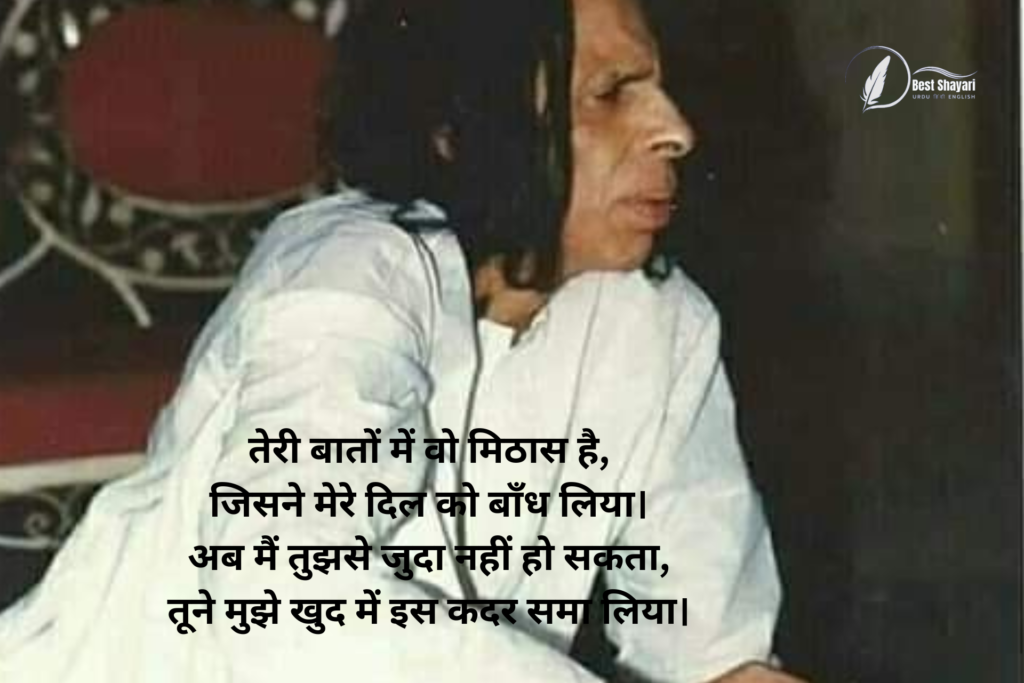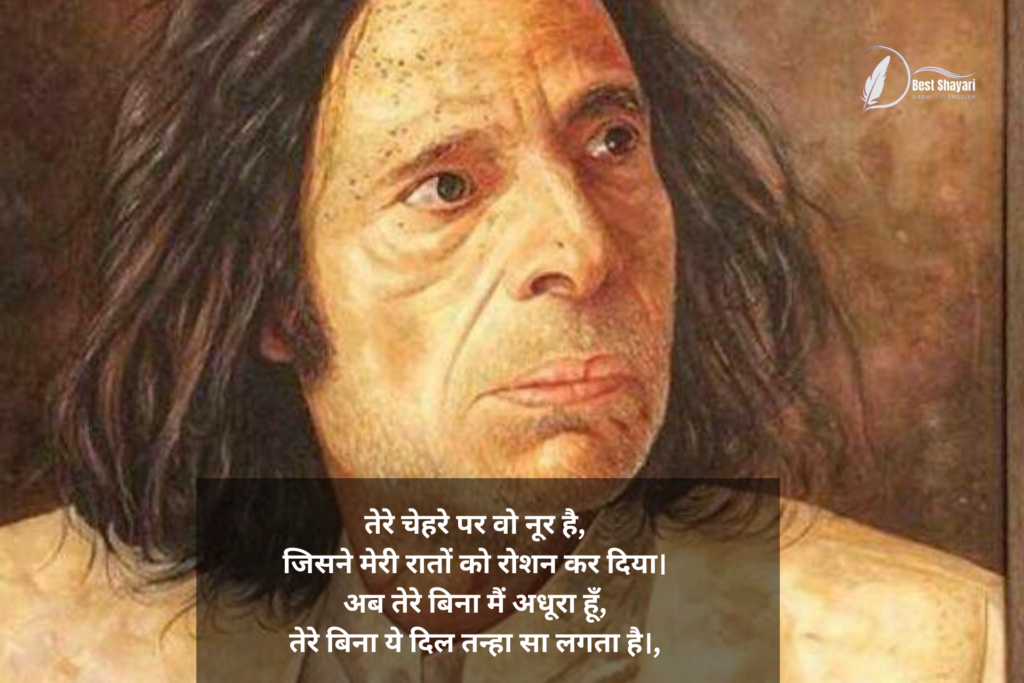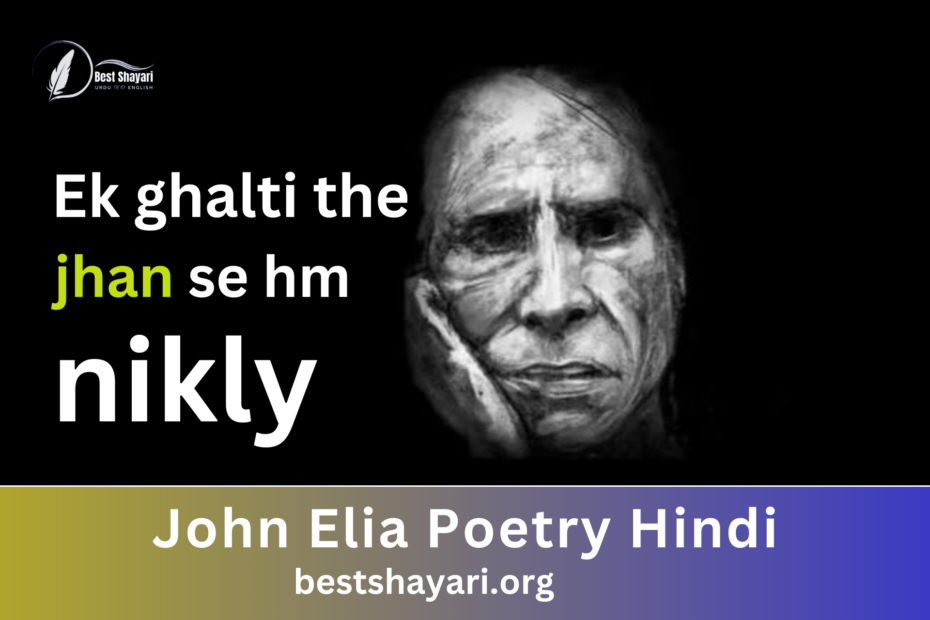John Elia, known for his untamed passion as well as profound sadness, is one of the best known Urdu poets. born in Amroha, India in 1931 and moved to Pakistan after partition. His poetry is filled with themes of nostalgia, loss and despair. He had wrote some excellent pieces of literary work where the readers lay in their desperation to love, most simply sad, philosophical and everything in between.
John Elia predominantly writes in Urdu, and has written much poetry which has a majority of its audience among Hindi belt. His themes love, betrayal, solitude, death etc are full of sensibility therefore, readers who are not very well acquainted with Urdu Language would easily relate to his poetry. This paper presents the translation of the poetry of John Elia from English into Hindi. It also focuses on the popularity of Hindi poetry among Hindi audiences and the Hindi translation of the John Elia’s English poetry.
So what makes John Elia’s style and themes different, if at all?
The poems written by John Elia usually combine the classical Urdu tradition and themes with a modern touch. His lines are often pathological and display an element of bitterness and black humor in most of his work. While most poets remain in the romantic idealism, Elia as most of his poetry is real without any facade, regarding the hard facts of life and emotions.
Another recurrent topic of his poetry is unfulfilled love. He is known for writing ghazals where the lady love is idealized and yet is out of reach or out of touch. This theme is addressed straightforwardly as many of the readers would understand what’s like when you lose someone dear to you because their love is not returned. When expressing these feelings, the same feelings are transferred in Hindi and this gives his work a larger audience.
Besides courtship, the verses of Elia’s poetry reach into the themes related to despair. He often tends to brood sobre la vida, la muerte y la inutilidad del hombre y las cosas que hace. These thoughts do not appear to be constricted by any form, since the essence of his thoughts correlates to people in a broad sense. He will say that even the Hindi versions of it tend to bear this philosophical orientation and so, readings of his poems will be a spiritual journey.

Some Lines On John Elia Poetry Hindi
मैं अपने आपको भी पहचान नहीं पाया,
तेरे इश्क़ में इस क़दर खो गया हूँ।
एक बार मिला था तू हंस कर मुझसे,
अब उसी हंसी की ख्वाहिश में बैठा हूँ।
तूने मेरे दिल में जगह बनाई,
मैंने तुझसे अपनी दुनिया बसाई।
तेरा जिक्र हर गुफ्तगू में करता हूँ,
क्योंकि अब मेरा दिल तुझसे ही जुड़ा है।
तेरी यादें हर पल मेरे साथ रहती हैं,
इन आँखों में सिर्फ़ तेरा ही अक्स बसता है।
तू जो न हो, तो सब कुछ फीका लगे,
इस दिल को अब तेरा ही सहारा मिलता है।
तेरे बिन ये जिंदगी अधूरी सी लगती है,
हर घड़ी तेरे बिना ये तनहा लगती है।
तेरे होने से ही सब कुछ है मेरे लिए,
अब तू ही मेरी ज़िन्दगी का मकसद है।
इश्क़ में तुझसे हार कर भी मैं जीत गया,
तू न समझा इस दिल की आवाज़, मैं कहता रहा।
तू है मेरी हर ख़ुशी की वजह,
अब मेरे दिल का हर अरमान तुझसे है।
तेरे प्यार ने मुझे नया जीवन दिया,
इस दुनिया में तेरा साथ सबसे प्यारा है।
अब और कुछ नहीं चाहिए मुझे,
तेरे प्यार में ही मुझे सुकून मिला है।
तू है मेरी उम्मीदों का सहारा,
हर दर्द का मरहम तू ही है।
अब तेरे बिना कुछ नहीं चाहिए मुझे,
तेरे प्यार ने मुझे सब कुछ दिया है।
तेरे बिना हर रास्ता वीरान है,
तेरे साथ हर मंज़िल आसान है।
अब सिर्फ़ तेरी चाहत में जीता हूँ,
तेरे बिना ये दिल हर पल उदास है।
तेरी चाहत में ये दिल मचलता है,
तेरे बिना मेरा दिल नहीं संभलता है।
अब तू ही मेरी धड़कनों का राज़ है,
तेरे बिना मेरी ज़िन्दगी अधूरी है।
तेरे प्यार में मैंने खुद को खो दिया,
अब मैं तेरे बिना अधूरा सा लगता हूँ।
तू है मेरे दिल की हर धड़कन में,
अब मेरे दिल का हर अरमान तुझसे है।
तू है मेरे हर सपने का हिस्सा,
तेरे बिना सब कुछ बेमानी सा लगता है।
अब मेरी दुनिया सिर्फ़ तुझसे है,
तेरे बिना ये दिल हर पल उदास है।
तेरे बिन ये जहाँ वीरान सा लगता है,
तेरे साथ ये दिल महकता है।
अब मेरी दुनिया में तू ही तू है,
तेरे बिना ये दिल हर पल उदास है।
तेरे बिना ये आँसू रुकते नहीं,
तेरे साथ ये दिल धड़कता है।
अब मैं तुझसे ही ज़िन्दा हूँ,
तेरे बिना ये दिल हर पल उदास है।
तेरे बिना ये जीवन अधूरा सा है,
तेरे साथ ये दिल खुशियों से भरा है।
अब मेरी दुनिया तेरे बिना नहीं चलती,
तेरे बिना ये दिल हर पल उदास है।
तेरे बिना ये दिल वीरान सा है,
तेरे साथ ये दिल मस्त सा है।
अब मैं तुझसे ही खुश हूँ,
तेरे बिना ये दिल हर पल उदास है।
तेरी यादें हर पल मेरे साथ रहती हैं,
तेरे बिना ये दिल उदास सा लगता है।
अब मेरी दुनिया सिर्फ़ तुझसे है,
तेरे बिना ये दिल हर पल उदास है।
तेरे बिना ये दिल वीरान सा है,
तेरे साथ ये दिल महकता है।
अब मैं तुझसे ही खुश हूँ,
तेरे बिना ये दिल हर पल उदास है।
तेरे बिना ये आँसू रुकते नहीं,
तेरे साथ ये दिल धड़कता है।
अब मैं तुझसे ही ज़िन्दा हूँ,
तेरे बिना ये दिल हर पल उदास है।
तेरे बिना ये जीवन अधूरा सा है,
तेरे साथ ये दिल खुशियों से भरा है।
अब मेरी दुनिया तेरे बिना नहीं चलती,
तेरे बिना ये दिल हर पल उदास है।
तेरे बिना ये दिल वीरान सा है,
तेरे साथ ये दिल मस्त सा है।
अब मैं तुझसे ही खुश हूँ,
तेरे बिना ये दिल हर पल उदास है।
तेरी यादें हर पल मेरे साथ रहती हैं,
तेरे बिना ये दिल उदास सा लगता है।
अब मेरी दुनिया सिर्फ़ तुझसे है,
तेरे बिना ये दिल हर पल उदास है।
तेरे बिना ये दिल वीरान सा है,
तेरे साथ ये दिल महकता है।
अब मैं तुझसे ही खुश हूँ,
तेरे बिना ये दिल हर पल उदास है।
You can also read : Shayari Welcome Poetry in Urdu for Guests
Translating John Elia’s Poetry into Hindi
It has to be said that working with verse is a rather unusual specialization for the present times, primarily as it relates to the works of John Elia. The Urdu literature, so rich in cultural and temporal aspects, can often present quite a problem in rendering. Regardless, the desire to capture the spirit of Elia’s poetry and make it available to Indian readers has been undertaken by a number of Hindi translators.
It is not simply transferring word from one language into another that defines this step in the process of translation. Understanding the basic emotions and feelings of the author and the poetry is a vital requirement and brings the heart of translation out. In the case of John Elia, there are elements of classical Persian literature, Sufism, and Eastern philosophy throughout his poetry. In order for the Hindi versions of his poetry to be accepted, translators will have to take these references into consideration carefully.
However, these problems have not helped the translators of the poetry of John Elia into Hindi as the conversion has been quite successful to capture the central touch of the verses in question. Translations of his poetry have introduced it to a new audience – Hindi speaking people who experience the same emotions as the Urdu speaking people have in the past.
Reactions to John Elia’s Poetry by Hindi Speakers
The response of John Elia’s poetry to Hindi speaking people has been nothing but positive. A fair number of readers, particularly the young ones tend to understand his honest portray of love, sorrow, and dilemma of existence. Students and social media users are fond of several quotes and couplets of John Elia’s poetry and most of the people have posted these online as people resonate with a poetic screen.
One factor that enhances his appeal to the Hindi speaking audience is the breadth of his themes. There are certain areas such as love, loss etc., that are beyond the confines of language. Even in Hindi translations of Elia, to a reader, the feeling of these emotions is retained, and hence it can be related to on a more personal level.
Additionally, the emergence of sites such as social media and book clubs has led to the interaction regarding John Elia’s literature. Fans of Hindi also sometimes post the translations of his verses and their explanations so that his admirers can read them in his language and this brings people together. This grass root level approach has thus been quite important in preserving the work of John Elia among Hindi speakers.

Some More Lines On John Elia Poetry Hindi
तेरी बातों में वो मिठास है,
जिसने मेरे दिल को बाँध लिया।
अब मैं तुझसे जुदा नहीं हो सकता,
तूने मुझे खुद में इस कदर समा लिया।
तेरे चेहरे पर वो नूर है,
जिसने मेरी रातों को रोशन कर दिया।
अब तेरे बिना मैं अधूरा हूँ,
तेरे बिना ये दिल तन्हा सा लगता है।
तेरी निगाहों में वो कशिश है,
जो हर बार मुझे अपने पास बुलाती है।
अब मैं तेरे बिना कुछ नहीं हूँ,
तेरी चाहत में ये दुनिया मेरी सजती है।
तेरे लफ्ज़ों में वो असर है,
जिसने मेरी धड़कनों को भी मात दे दी।
अब तेरे बिना ये दिल धड़कता नहीं,
तेरे बिना ये जिंदगी अधूरी सी लगती है।
तेरी खामोशी में भी वो आवाज़ है,
जो मेरे दिल को हर बार सुनाई देती है।
अब मैं तेरी हर बात में खो जाता हूँ,
तेरे बिना ये दिल हर पल तड़पता है।
तेरी हंसी में वो जादू है,
जिसने मेरे दिल को भी मुस्कराना सिखा दिया।
अब तेरे बिना ये मुस्कान अधूरी सी है,
तेरे बिना ये दिल हर पल उदास है।
तेरे स्पर्श में वो गर्मी है,
जिसने मेरे दिल को भी पिघला दिया।
अब तेरे बिना मैं खुद को खोया हुआ पाता हूँ,
तेरे बिना ये दिल हर पल उदास सा रहता है।
तेरी यादें मेरे दिल में बसी हैं,
जो हर घड़ी मेरे साथ रहती हैं।
अब तेरे बिना ये दिल चैन नहीं पाता,
तेरे बिना ये रातें भी अधूरी सी लगती हैं।
तेरे ख्वाबों में मैं खो जाता हूँ,
तेरे बिना ये दिल कुछ नहीं पाता है।
अब तेरे बिना ये जीवन अधूरा है,
तेरे बिना ये दिल हर पल तड़पता है।
तेरे आने से मेरी दुनिया संवर गई,
अब तेरे बिना ये दिल वीरान है।
तेरे बिना ये आँखें भी रोती हैं,
तेरे बिना ये दिल हर पल उदास है।
तेरे बिना ये सफर अधूरा सा है,
तेरे साथ ये दिल मंज़िल पा गया।
अब मैं तेरे बिना कुछ नहीं हूँ,
तेरे बिना ये दिल हर पल तड़पता है।
तेरे नाम से मेरी रूह महकती है,
तेरे बिना ये दिल उदास रहता है।
अब तेरे बिना मैं अधूरा हूँ,
तेरे बिना ये दिल हर पल तड़पता है।
तेरे बिना ये शहर वीरान सा है,
तेरे साथ ये दिल महकता है।
अब मैं तुझसे ही खुश हूँ,
तेरे बिना ये दिल हर पल उदास है।
तेरी तस्वीर में मैं खुद को पाता हूँ,
तेरे बिना ये दिल सूनसान है।
अब तेरे बिना मैं खुद को खो चुका हूँ,
तेरे बिना ये दिल हर पल उदास है।
तेरे ख्यालों में मैं डूब जाता हूँ,
तेरे बिना ये दिल बेसहारा है।
अब तेरे बिना कुछ नहीं बाकी है,
तेरे बिना ये दिल हर पल तड़पता है।
तेरे वादों में वो सच्चाई थी,
जिसने मेरे दिल को भी यकीन दिला दिया।
अब तेरे बिना मैं खुद को तनहा पाता हूँ,
तेरे बिना ये दिल हर पल उदास है।
तेरे बिना ये दिन भी अधूरे हैं,
तेरे साथ ये दिल खुशी से भरता है।
अब तेरे बिना कुछ नहीं चाहता हूँ,
तेरे बिना ये दिल हर पल तड़पता है।
तेरी बातों में वो मिठास है,
जो हर बार मेरे दिल को लुभाती है।
अब तेरे बिना मैं खुद को खोया हुआ पाता हूँ,
तेरे बिना ये दिल हर पल उदास है।
तेरे बिना ये खामोशियाँ भी चुभती हैं,
तेरे साथ ये दिल चैन पाता है।
अब मैं तेरे बिना कुछ नहीं हूँ,
तेरे बिना ये दिल हर पल तड़पता है।
तेरी मोहब्बत में वो ताकत है,
जिसने मेरे दिल को भी मजबूत कर दिया।
अब तेरे बिना मैं अधूरा हूँ,
तेरे बिना ये दिल हर पल तड़पता है।
तेरी हर अदा में वो नशा है,
जो मेरे दिल को मदहोश कर देता है।
अब तेरे बिना ये दिल कुछ नहीं पाता,
तेरे बिना ये दिल हर पल तड़पता है।
तेरी चाहत में मैंने खुद को खो दिया,
अब तेरे बिना मैं अधूरा सा हूँ।
तू है मेरी हर धड़कन की वजह,
तेरे बिना ये दिल हर पल तड़पता है।
Analysis of Popular John Elia Poems in Hindi
In order to comprehend the significance of John Elia’s poetry in Hindi, it is important to focus on some of those works which previously remained too popular and were obviously translated. The poems presented reflect the range of his talent and the depth of feelings he was capable of writing about.
Although, John Elia’s paper also consists of translations only, it is not the only sphere, which has been in Elia’s concern. Common present-day Hindi poets have draw inspiration from him, for they see in him the epitome of an emotional poet, anachronistically crude in articulation. This part may focus on how his understanding of poetry has affected Hindi literature, giving rise to a fusion of the Urdu and Hindi forms of poetry.
FAQ’s
Who was John Elia?
John Elia was a famous Urdu poet, philosopher, biographer, and scholar. He was born in Amroha, India, in 1931 and immigrated to Pakistan after the Partition. John Elia is a poet whose work is remarkable for its emotion reaching out to love, loss, and existential melancholy in a dystopian world.
How come John Elia’s poetry appeals to Hindi speakers?
John Elia’ s poetry is unmoored within language, as it has themes like love, agony and contemplation about existence. Thus, his poetry, or rather the thoughts that are expressed through his poetry, are well received by the Indian audience even through translations.
What is the method of Hindi translation of John Elia’s poetry?
In terms of the Hindi translation of John Elia’s poetry, it is not only a transfer of language but a translation of the emotions, elements, and meaning contained in his work. In contrast, the effective translations do not sacrifice the intensity of the emotions displayed in his poetry but rather make it available to the Hindi audience.
What are some difficulties in translating John Elia’s poetry into Hindi?
Since Urdu is rich in culture and history, which are the main reasons for the difficulties in translation. There should be proper emotion, as in the poetry being translated, the emotion should not get lost due to language differences. Also, some of the artworks and philosophy shown in his work have to be well presented in Hindi so that their essence does not lose in translation.
What are the common themes in John Elia’s poetry?
The themes common in the poetry of John Elia includes: love that is not returned, depression, existentialism, disappointment, and loneliness, and some pondering of humanity. His poems usually centre on sorrow caused by parting, the quest for the purpose of existence, and death.
Give reasons, which John Elia’s poem is still relevant why the elitists?
John Elia is not a dead author; his poetry is still read and appreciated even today because it functions as a perpetual canvas to all the emotions, insights related to life and death. Reading about and through elias magan what market difference you in the end the impact is still felt in urdu and hindi.
Conclusion
To sum up, it can be stated with proper substantiation that John Elia is a poet who handled and molded sensitive human emotions and feelings into words not only in Urdu but Hindi too. His work is clearly very powerful and the sentiments, that are expressed in the poetry, transcend borders. Even in the Hindi speaking regions, where his poetry gets translated, surely his dimensions to feel deep emotions in words as a poet Blanche in the picture the poetics of John Elia will be hitherto secure.

